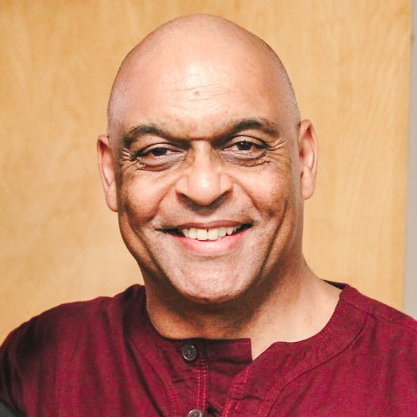By Makinto
Growing up as an atheist in a staunchly secular German family, nothing prepared me nor foreshadowed my call to ministry, other than the will and plan of God in his infinite mercy and wisdom. Although I was surrounded by churches, the primary purpose of a church, in the eyes of my father, was to host organ concerts or be the objects of admiration for historical facts and architectural beauty. Although a protestant church offered rehearsal space to my first teen jazz band, the first time I heard the gospel was at age 16, on a European bicycle tour, when I was accosted by a barely older teen at a fountain in Rotterdam, Netherlands who explained Jesus to me in two minutes.
Curiously, many of the songs I wrote in my early professional music career, even before coming to Christ, talked about mercy, love, a higher power or even God. It was as if my spirit longed to have a relationship with a creator I didn’t know. God also endowed me with a personality that seeks balance and reconciliation and is interested in other people’s well-being, thus foreshadowing pastoral characteristics.
As a professional musician and performer, I was keenly aware that music had the power to bring people together and create an atmosphere of unity, albeit temporarily. I even experienced the redeeming and healing power of music: one night in Paris at an after-hours jazz bar, I performed an original song describing the power and glory of God (this was 10 years prior to giving my life to the Lord Jesus). A distinguished elderly lady in the audience was healed from a chronic condition, which she testified about tearfully the following night, attributing it to listening to my song the previous evening. Although I lacked a personal relationship with God at the time, I nevertheless got a glimpse of God’s power and care for his people.
Being a critical and analytical person, I researched every mayor religion to understand their core values and teachings: I read the Quran, the Bhagavat Ghita, Confucian Analects, and the Bible. All these writings talked about love as the central element of God’s transforming power and character. Fast forward to 1999 at Day Spring Church, a Bible-believing, Holy Spirit-filled charismatic church in New York City. I was increasingly convinced that the real, living God teaching, expressing, and modeling true love was the one who sacrificed himself on the cross for the people he loved. On a trip to Burkina Faso in May 2000, I gave my life to the Lord Jesus Christ.
My wife Mukarabe and I promptly immersed ourselves in praise, prophetic, and intercessory ministry and were ordained into ministry by Dayspring Church in NYC in 2003. That same year, prompted by the Holy Spirit, we left the East Coast and journeyed 11 months in a travel trailer across the continental United States. God taught us valuable lessons concerning faith, prophetic ministry, provision, healing, and obedience. We became the praise team for a church in Mississippi for three months, opened a soup kitchen, held revival and reconciliation services, and praised Him on campgrounds, city parks, and churches of many denominations in what we called “A family traveling for Jesus.”
In 2005 God led us to Los Angeles (California) Faith Chapel, an urban church in LA mostly attended by Nigerians and African Americans, affiliated at the time with PSMC (Pacific Southwest Mennonite Conference). Pastor Chuwang Pam invited me to be part of his pastoral staff as Associate Pastor of Worship and Men’s ministry, true to the central mission of the church found in 2 Timothy 2:2.
Since then, God has allowed me to serve three churches as Pastor of Worship and Musical director, teach and preach the word, gain a certificate in Anabaptist studies from Hesston College, and be a credentialed minister in the process of ordination at Mosaic Conference.
My pastoral role extends also to our mission in East Africa. Amahoro International, our nonprofit organization and Conference-Related Ministry (CRM) of Mosaic Conference, operates a refugee development center in Uganda. I have come to realize that God has equipped me for service in unorthodox pastoral, missional, and counseling positions that don’t always fit traditional church settings. The same is true for Joyful Music & Arts, the music school I founded in 2009 in California. Many students call me their pastor, and some of them do not attend or are not declared Christians.
This is not to say that I won’t at some point respond to a pastoral calling in a local church or plant one, here in the US or in Africa. But I have learned to follow the Holy Spirit’s leading, and He has often led me towards unorthodox ministry according to His will. His thoughts are indeed higher than our thoughts, and his plans higher than ours. Despite my own shortcomings, I have learned to trust and wait on God’s leading.

Makinto
Pastor Makinto is director of Amahoro International, a mission organization promoting peace and development in East Africa, a Conference-Related Ministry. He has toured the world for 30 years as an international musical performer.
The opinions expressed in articles posted on Mosaic’s website are those of the author and may not reflect the official policy of Mosaic Conference. Mosaic is a large conference, crossing ethnicities, geographies, generations, theologies, and politics. Each person can only speak for themselves; no one can represent “the conference.” May God give us the grace to hear what the Spirit is speaking to us through people with whom we disagree and the humility and courage to love one another even when those disagreements can’t be bridged.
This post is also available in: Español (Spanish)
This post is also available in: Español (Spanish)
